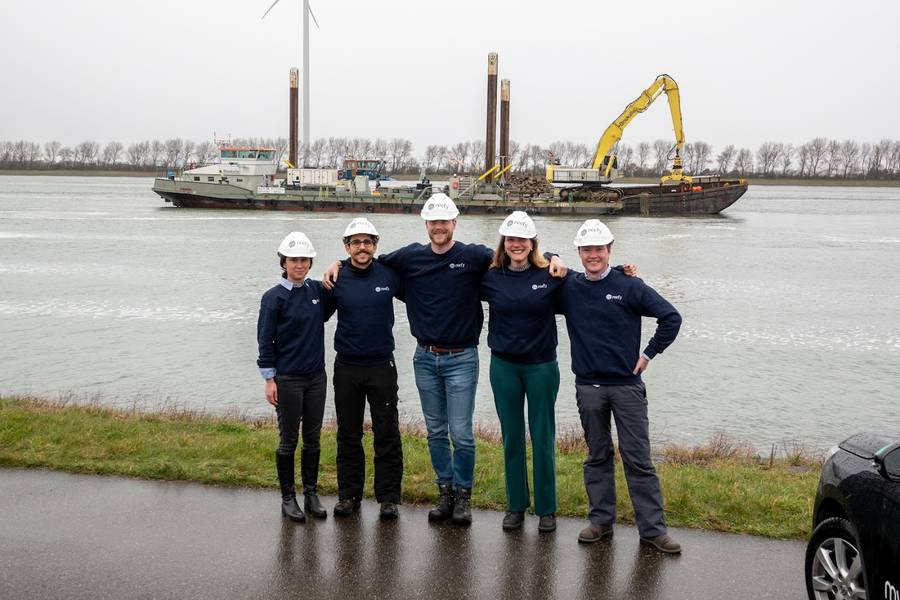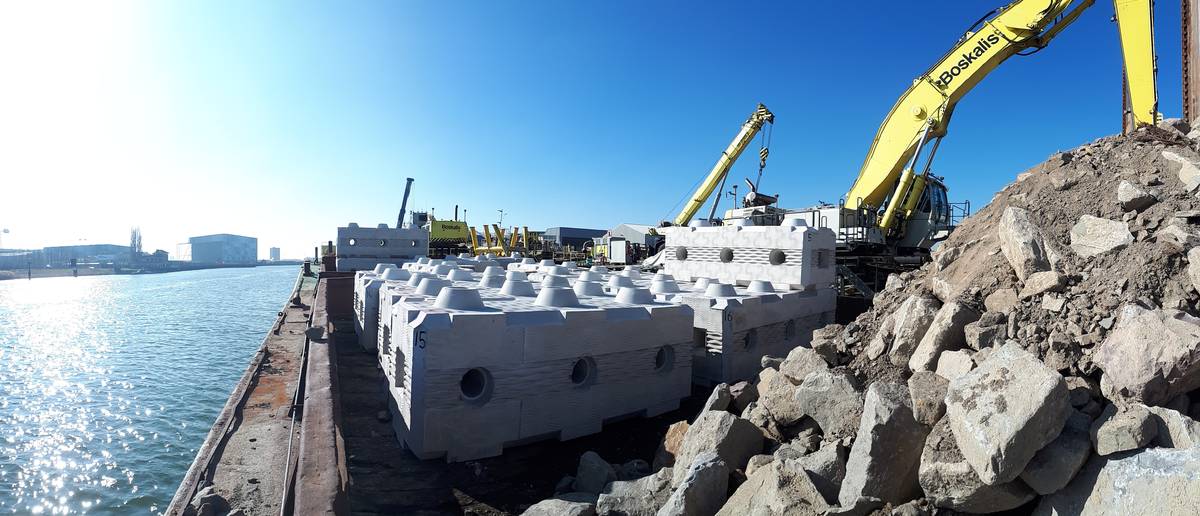Two Specialists with a Mission
Reefs are the foundation of marine ecosystems. These natural barriers help mitigate the risks of climate change, such as biodiversity decline. Rising sea levels and increased storm activity have turned coastal erosion into a global issue. Jaime also observed this in his homeland: "Existing artificial reefs are not stable enough and lack the potential to protect the land and underwater life from the impacts of climate change. In 2017, I came to the Netherlands to pursue a master's degree in hydraulic engineering at TU Delft and completed internships with Boskalis and Deltares. Leon also recognized the limitations of scaling up reef restoration using existing techniques. We now combine our knowledge and experience as coastal engineers and marine biologists to create the best solution for nature and mankind."

Milestone in the Maas River
Soon after, a period of development and testing followed in collaboration with Deltares, Burgers' Zoo, and Diergaarde Blijdorp. They developed a modular, artificial reef that is stable enough to dissipate hurricane-level wave energy for coastal protection. Simultaneously, the innovation, resembling stackable Lego blocks, provides a habitat to enhance biodiversity. In early 2023, 17 reef blocks were installed at Landtong Rozenburg in the Nieuwe Waterweg. 'Rotterdam Reef' is 25 meters long and 3 meters high. Jaime remarks about this milestone, "We need to approach water engineering projects in a new way and collaborate with nature. Ecological foreshores grow along with sea levels, and the reef blocks, with their gaps and tunnels, create a habitat for underwater life." Investments like these enable Reefy's growth. Currently, a team of six specialists operates in Delft, where the company is headquartered at the Buccaneer facility. In addition to Dutch projects, they are looking towards projects in Mexico and the southeastern coast of the United States in the near future.

Thus, Reefy focuses on establishing a mature ecosystem. Nature requires time to recover, and the reef blocks mimic and support this process: "Rotterdam Reef is the first 'living wave breaker' in the Netherlands that restores marine biodiversity. It acts as a nature-inclusive wave barrier against ship-generated waves and currents. This creates conditions for sedimentation and plants in an ecologically vibrant foreshore that has the capacity to adapt to rising sea levels. This project embodies the essence of our vision. We continue to invest in R&D to offer the best possible product. However, we also keep the commercial and business aspects in mind. Ultimately, we need to sell the product, and the entire team contributes to that. Besides monitoring ongoing projects, we are also moving towards new projects and future international activities. The projects in Mexico will soon complete a circle for me as the founder."
About Reefy
-
Reefy develops innovations for the blue economy to enhance marine life. Using modular Lego-like blocks, an artificial reef is created. These blocks dissipate wave energy and provide a habitat for marine life and biodiversity. This patented innovation is called the REB: Reef Enhancing Breakwater. As natural barriers decline, erosion leads to the disappearance of beaches and threatens assets and infrastructure with destruction from large waves. Restoring reef systems is therefore crucial for coastal protection. Instead of working against nature, Reefy leverages nature's capabilities for growth and adaptation, improving technical solutions. Innovations like ReefBlock and Eco-block together create a modular system for coastal protection and the creation of an underwater habitat.
Entrepreneurship and survival
Challenges have been present since Reefy's inception: "In the beginning, we had to adjust our expectations. The companies we collaborate with often have a different pace than a start-up eager to make rapid progress. We think big but take small steps towards our goals. In the upcoming period, we aim to have even more impact, with large projects and miles of artificial reefs. In nature, everything is interconnected. In companies, there's often a budget for infrastructure and a separate budget for nature. Bringing these two together already creates more opportunities, and we are eager to contribute to that. In practice, I've learned a lot about business and the roles that come with it. As an entrepreneur, I wear many hats. Starting entrepreneurs should be open to that.
Moreover, having a strong network is crucial. At the Buccaneer, we are part of a large network of partners, innovators, and start-ups. Starting and growing a business isn't an easy path, and the initial years were mostly about survival. Besides believing in an innovation, believing in the business aspect is equally necessary. Trying to do everything alone doesn't advance anyone in this world. In conversations with investors, we discovered that our innovation is easy to visualize. They have no trouble assessing the value of the solution; only the business side needs extra attention. Therefore, we focus heavily on communication and storytelling. This has already garnered attention from various (foreign) media."
NGOs and small companies already place coral fragments or oysters for reef restoration: "While effective in the long run, it remains small-scale. With our solution, we position ourselves between these projects and large infrastructure initiatives. That's how we've positioned ourselves, and we never speak of competition. Everyone working on this shares the same ultimate goal and raises awareness about this issue. We want to make a bigger impact and support our team in the best possible way. We celebrate successes, maintain continuous dialogue – internally and with customers – and foster an innovative environment within the network. Our vision also includes developing other products and applications, such as ecological erosion protection for offshore wind."
